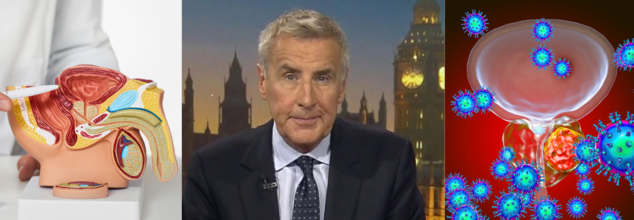- Health Conditions A-Z
- Health & Wellness
- Nutrition
- Fitness
- Health News
- Ayurveda
- Videos
- Medicine A-Z
- Parenting
- Web Stories
You Know What? Wearing Black Underwears Do Not Cause Breast Cancer - Myths Busted By Expert

Every year in October, we observe breast cancer awareness month to spread awareness and educate people about this cancer, most common in women. As per the World Health Organisation (WHO) is the most common cancer in women in 157 countries out of 185, in 2022. In India, it accounts for 27% of all cancers.
What Is Breast Cancer?
It is a cancer that begins as a growth of cells in the breast tissue. As per WHO, it begins inside the milk ducts of the breast, and the earliest form is not life-threatening and can be detected in the early stages. Cancer cells spread into nearby breast tissue, creating tumours that cause lumps or thickening.
Invasive cancers can also spread to nearby lymph nodes or other organs. While the exact source of what causes it has not been yet found, many claims are already existing around it. To check whether these claims are valid, we spoke to Dr Namrata Singal Sawant, Director and Senior Breast & Women's Imaging Consultant Radiologist at Vcare Imaging Diagnostic Centre, Mumbai.
Claims
Wearing A Bra Causes Breast Cancer
This idea was fueled by the 1995 book called Dressed to Kill by Sydney Ross Singer and Some Grismaijer which claimed that women who wear underwire bras for 12 hours a day have a much higher risk of developing breast cancer. The book claims that it restricts the lymph system, which can result in a build-up of toxins in the breasts. However, there is no credible research that shows a link between the two.
Dr Namrata says, "While many of my patients ask me this question, especially about underwired bras or black bras; there has been no scientific evidence to claim the same. Although ill-fitting bras do cause chest pain or breast pain sometimes if too tight. But not cancer."
Sugar Consumption Can Caused Increased Risk of Breast Cancer
"It might be associated with many other health issues but has not been associated with breast cancer yet. However, keeping the sugar levels under control is very important for health healing of any breast infections or inflammatory disorders. Diabetic mastopathy is an important mimicker of breast cancer on imaging," says the doctor.
Wearing Black-dyed Clothes Can Cause Breast Cancer
The doctor says that it has not been proven by any scientific studies; however, wearing clothes with natural fibres and maintaining personal hygiene in the form of cleaning ourselves and our clothes regularly is a must.
Pregnancy Increases The Risk of Breast Cancer
As per the National Cancer Institute, the older a woman is when she has her first full-term pregnancy, the higher her risk of breast cancer. "Having our conventional reproductive customs like a first child before the age of 30 years and breastfeeding has been known to be associated with lower risks," says Dr Namrata. She also highlights the reports of Hormonal replacement therapy associated with increased risk of breast cancer.
Therefore, pregnancy does not increase the risk of breast cancer.
Men Cannot Have Breast Cancer
While it is rare, male breast cancers can happen. As per WHO, approximately 99% of breast cancers occur in women and .5 to 1% occur in men.
"In fact, any lump, nipple discharge or skin changes must be looked up with higher suspicion in males as compared to females. In fact, males do not have fibroadenomas which are the most common benign lumps in females. There are no screening programmes for breast cancer for males as of now. Hence, it is very important to bring this awareness amongst men and also in our family to be aware of its symptoms," explains Dr Namrata.
Breast Cancer Cannot Happen Again
"Well! Some types of breast cancer when diagnosed early have excellent prognosis to treatment. Whereas there are others especially “Triple-negative types” which are notorious for poor prognosis and recurrence. If the cancer is diagnosed late, or positive margins have been left behind during breast conservative treatment or some kind of treatment failure, there are definite chances of recurrence," explained the doctor.
Flying Can Be Risky If You Have These Health Conditions

Flying is a common and generally safe way to travel for vacations, whether you're going on a romantic trip or visiting family. While planes do give us a convenient mode of transport, they do come with certain health considerations. Issues can range from simple stress to more complex physical changes that affect your heart, blood vessels, and even your brain.
Can The Air Inside The Cabin Cause Issues?
The air inside a commercial flight cabin is pressurized to feel like you're at an altitude similar to being in a mountain town, like Estes Park, Colorado, which is around 6,000 to 8,000 feet high. This means there's slightly less oxygen available than you might normally breathe. The cabin air can also be very dry, with low humidity levels.
For most healthy individuals, breathing the cabin air isn't an issue. However, lower air pressure can worsen existing conditions for some people. This includes those
- Anemia
- Underlying lung problems
- A history of stroke
- Other conditions requiring extra oxygen
- Individuals with heart disease or heart failure
If you have any concerns about whether flying is safe for you, it's always best to consult your doctor, especially if you've recently experienced a heart attack or stroke.
Things People With Heart Conditions To Keep In Mind
The reduced air pressure also causes gases trapped inside your body to expand. This can be a concern for anyone who has had bypass surgery within the last 10 days. Expanding air can also lead to common discomfort like abdominal pain, sinus pain, or "airplane ear." While decongestants can help with ear and sinus symptoms, it's important to note they can raise blood pressure and should be used cautiously, especially if you have severe or uncontrolled high blood pressure.
Other Travel Health Tips For Safety
Staying Hydrated and Avoiding Germs in the Cabin
Plane air is very dry, which can cause dry eyes or a cough. To stay hydrated, always carry a water bottle to fill after security and limit dehydrating drinks like caffeine and alcohol. Modern planes have clean, filtered air, reducing widespread germ spread. However, you can still catch germs from nearby passengers, so carrying a face mask is a smart precaution, especially if someone near you is coughing.
Minimizing the Risk of Blood Clots
Long flights mean long periods of sitting still, which increases the risk of blood clots (DVT), especially in your legs. While rare, these can be serious if they travel to your lungs. To help prevent them, consider wearing compression socks on longer flights. Also, stay hydrated, avoid crossing your legs, flex your leg muscles, and walk around the cabin when safe. Always keep your seatbelt fastened to avoid injury from unexpected turbulence.
Managing Stress During Air Travel
Air travel can be stressful, impacting your mental well-being. To cope, practice patience and understanding with fellow passengers and flight crew. If you're a nervous flier, use familiar calming techniques like deep breathing or listening to music. Traveling with a supportive companion can also help. Remember to avoid alcohol, as it can actually worsen anxiety and dehydration, making a stressful situation even more challenging.
Essential Pre-Flight Health Preparations
Before your trip, it's crucial to consult your doctor to ensure you're fit to fly. The physical demands of travel, like navigating airports, can be surprisingly strenuous. If cleared, keep all medications in your carry-on and have a list of them handy. If you have a heart condition, carry a copy of your ECG or device card. For international trips, confirm your vaccinations are current. Finally, pack snacks and food for potential delays.
Prioritizing Sleep While Traveling
Travel often disrupts sleep, which is vital for heart health. Adjusting to new time zones is harder when flying east; aim for mid-morning light exposure to reset your body clock. While getting sleep is important, be careful with alcohol, as it can hinder restful sleep despite making you drowsy. Avoid new sleep aids or anxiety medications. Instead, stick to your usual bedtime routine, like reading, to help maintain normalcy on your journey.
Fact Check: Can Scorpion Venom Really Treat Cancer?

Credits: Canva
Of the many bizarre things you may have heard, at the FAPESP Week France, researchers at the University of Sao Paulo presented their study findings stating that scorpion venom could help treat breast cancer.
What Is The Study All About?
The researcher found that a molecule which is present in scorpion venom could act similarly used in that of the chemotherapy drug, which could then kill cancer cells.
The molecule is called BamazScplp1, found in the venom of Brotheas amazonicus scorpion. It showed cancer-fighting properties when tested in lab.
"Through bioprospecting, we were able to identify a molecule in the species of this Amazonian scorpion that is similar to that found in the venoms of other scorpions and that acts against breast cancer cells," said Eliane Candiani Arantes, a professor at the university and the project's coordinator.
How Was The Study Conducted?
The researcher used a process called heterologous expression, which allowed them to produce the required toxin content for the study. In this process, the gene that produces this particular protein was inserted in another organism, most often, this is usually yeast or bacteria and then later produced in large quantities inside the lab.
"We also intend to obtain these molecules through heterologous expression," said Ms Arantes."Our idea now is to obtain this serine protease through heterologous expression [in a fragment or complete gene from a host organism that doesn't have it naturally] in Pichia pastoris," she added.
Tests on breast cancer cells showed that the peptide produced a response similar to paclitaxel, a widely used chemotherapy drug for treating the disease.
"The peptide induces cell death mainly through necrosis, an action similar to that of molecules identified in other scorpion species," the study highlighted.
Have There Been Similar Findings Before?
In a 2017 study, titled Scorpion and spider venoms in cancer treatment: state of the art, challenges, and perspectives, it was revealed that animal venoms do comprise a mix of bioactive molecules with high affinity for multiple targets in cells and tissues.
The study used scorpion and spider venoms and purified peptides that exhibit "significant effects on cancer cells". It led to four potential mechanisms: induction of cell cycle arrest, growth inhibition and apoptosis; inhibition of angiogenesis; inhibition of invasion and metastasis; and blocking of specific transmembrane channels.
The study noted: "Cancer is a considerable global contributor to disease-related death. Despite some advances being made, therapy remains palliative rather than curative for the majority of cancer indications. Consequently, more effective therapies need to be devised for poorly responding cancer types to optimize clinical cancer management. Scorpion and spider venoms may occupy a role in the development of improved anti-cancer modalities."
Another study published in 2013, titled Two peptides, TsAP-1 and TsAP-2, from the venom of the Brazilian yellow scorpion, Tityus serrulatus: Evaluation of their antimicrobial and anticancer activities, noted that scorpion venom contains a mixture of biological chemicals called peptides, some of which are known to trigger cell death by forming pores in biological membranes, as also reported in The Conversation. Cell death can be useful if we are able to target, say, tumour cells to auto-destruct.
These toxins can have very potent effects. For instance, one particular small peptide, known as TsAP-1, isolated from the Brazilian yellow scorpion (Tityus serrulatus), has both anti-microbial and anti-cancer properties.
Ex-Sky TV Presenter Dermot Murnaghan Reveals Stage 4 Prostate Cancer

Credits: Canva and SKY News
Veteran journalist and broadcaster Dermot Murnaghan has revealed that he has been diagnosed with stage 4 prostate cancer.
The 67-year-old, known for anchoring major news shows across ITV, BBC, and Sky News, shared the news on social media. He also added that he is currently feeling well and responding positively to treatment.
Murnaghan wrote on X (formerly Twitter), “Some personal news… I’ve been diagnosed with Stage IV advanced prostate cancer.”
He added, “I’m fortunate to have a simply outstanding medical team looking after me, who I can’t thank enough—they are administering the best possible care with expertise, compassion and sensitivity.” He also shared his gratitude for the "monumental love and support" he’s received from his wife, family, and close friends.
Drawing From Personal Experiences To Raise Awareness
Murnaghan used his post to raise awareness about prostate cancer and called on men, especially those over 50 or in high-risk groups, to get themselves tested. “Early detection is crucial,” he wrote. “And be aware, this disease can sometimes progress rapidly without obvious symptoms.” He also voiced his support for routine prostate cancer screening through the NHS.
Despite his diagnosis, Murnaghan said he hopes to take part in the upcoming Tour De 4 charity bike ride in Glasgow this September. The event is organized by Olympic cycling champion Sir Chris Hoy, who also has prostate cancer. The ride aims to challenge public perceptions about living with stage four cancer and show that many people continue to lead active, fulfilling lives even while undergoing treatment.
Life of Dermot Murnaghan
Dermot Murnaghan has had a long and respected career in British media. He began his journalism journey at Channel 4 News and later anchored ITV’s The Big Story, News at Ten, Evening News, and Nightly News through the 1990s and early 2000s. In 2002, he moved to the BBC, where he became a familiar face on BBC Breakfast, the Six O'Clock News, and the Ten O’Clock News. From 2003 to 2014, he hosted the popular BBC quiz show Eggheads. He joined Sky News in 2007, where he remained a leading anchor until 2023.
In addition to his news broadcasting, Murnaghan has presented true-crime documentary series such as Crimes That Shook Britain and Killer Britain. He also currently hosts a podcast called Legends of News, where he speaks with experienced journalists about some of the most significant stories they've covered.
What is Prostate Cancer?
Prostate cancer affects the prostate gland, a small walnut-sized part of the male reproductive system located just below the bladder. It is most common in older men, particularly those over 75. Risk factors include age, family history, and ethnicity, with black men facing a higher risk.
Symptoms can include frequent urination (especially at night), difficulty starting or stopping urination, weak urine flow, and blood in urine or semen. However, some cases progress without noticeable symptoms.
Stage 4 prostate cancer means the disease has spread to other parts of the body. While outcomes vary, around half of men diagnosed at this stage live for five years or more, according to Cancer Research UK.
Murnaghan’s message is clear: awareness and early testing can make all the difference.
© 2024 Bennett, Coleman & Company Limited

